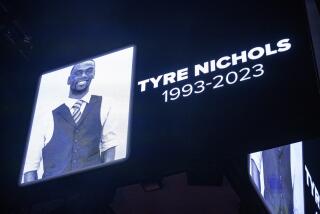Prosecutors to Claim Powell Let King Rise, Then Pummeled Him : Courts: Memo outlines how U.S. hopes to show that officers willfully deprived the motorist of his civil rights. Defense lawyer says the opposition’s case is weak.
- Share via
In contrast to accounts by four Los Angeles police officers charged with violating Rodney G. King’s civil rights, prosecutors said in a memorandum filed Thursday that Laurence M. Powell allowed King to get up off the ground and then used the opportunity to pummel him with his baton.
“Defendant Powell made no attempt to keep King down, but instead allowed King to stand up and start moving,” prosecutors said in their trial memorandum, which lays out their case for the upcoming trial.
“As King started to move in a direction near Powell, Powell hit King with a baseball-bat like swing of the baton, knocking him to the ground. Defendant Powell continued to strike King with his baton approximately 10 times after King fell down,” they wrote.
That description is markedly different from the one offered by Powell and his co-defendants, Stacey C. Koon, Theodore J. Briseno and Timothy E. Wind. They allege that King charged at Powell, and that Powell struck him because he was resisting arrest and had to be subdued.
The distinction between the two accounts is crucial, because prosecutors in the upcoming federal trial will be required to prove that the officers willfully deprived King of his civil rights. U.S. District Judge John G. Davies, who is presiding over the case, has referred to that requirement as a “high and heavy burden” that prosecutors must satisfy to win convictions.
To meet that burden, prosecutors also say they intend to introduce statements and computer messages by the officers, as well as police reports that prosecutors say were misleading. They also plan to admit portions of testimony that Briseno gave during last year’s state trial.
Prosecutors also challenge Briseno’s account of his actions on the night of March 3, 1991. Briseno is shown on the videotape of the beating stomping on the upper part of King’s body. He maintains that he was attempting to force King back to the pavement so that the other officers would stop beating him.
Prosecutors, however, say that King already was moving to comply with police commands when Briseno stomped him.
“King began to move his arms toward his back, in response to commands that he put his hands behind his back,” prosecutors wrote. “As he did so, defendant Briseno stomped on his head, neck or back, causing King’s body to convulse.”
Harland W. Braun, Briseno’s lawyer, said he was relieved to find that the prosecution’s case, as outlined in its memorandum, “is so weak.” He reiterated that Briseno’s stomp was an instantaneous reaction in the midst of a violent melee, and that it was intended to protect King, not hurt him.
Prosecutors said they expect to call between 35 and 40 witnesses during the presentation of their main case--almost twice as many as were called during last year’s state trial, in which the jury returned not guilty verdicts for all four defendants. Federal prosecutors also plan to play tape recordings of a number of radio calls from the night of the incident.
They do not intend to introduce an inflammatory call from a police dispatcher to a Los Angeles Fire Department dispatcher in which the police officer suggests that King was beaten because he tried to flee. Neither of those dispatchers was a witness to the beating, and legal experts say their conversation would be inadmissible because it is hearsay.
The prosecutors’ description of the events leading to King’s arrest closely parallels King’s own account, given to a federal grand jury on July 23, 1992.
In that interview, King conceded that he fled when California Highway Patrol officers tried to pull him over, saying he was afraid of going to jail. But King insisted in that sworn testimony that he never attacked or threatened the officers.
Wind’s actions are not covered in the same detail as Powell’s, but prosecutors allege that Wind and Powell together beat King as he lay on the ground. After King rose to a sitting position, Wind “kicked him in the head, neck or back six times,” prosecutors add.
Although Koon is not charged with striking King, he was the supervisor at the scene and he “made no effort to stop defendants Powell, Wind and Briseno from striking, stomping and kicking Rodney King,” according to the memorandum.
More to Read
Sign up for Essential California
The most important California stories and recommendations in your inbox every morning.
You may occasionally receive promotional content from the Los Angeles Times.














